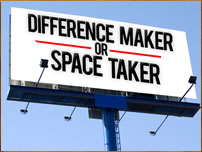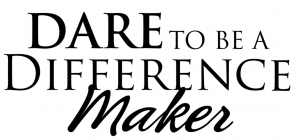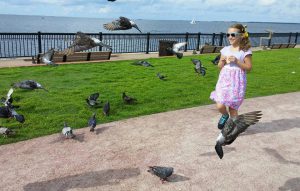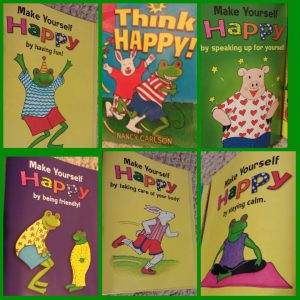The Power of Words and how to Talk like TED
I gave the below speech today to the Gulf Power Engineering Society and my fellow Toastmasters group on May 26, 2016. I wrote this in March 2016 and finally had the opportunity to deliver it for a crowd in the way I wanted.
This was my final speech to complete the Toastmasters Competent Communicator manual. I met my goal of finishing all ten speeches by end of May 2016. I began with speech # 1 in August of 2015.
I’m really proud of how far I have come and my confidence in giving public presentations. Thank you to my Toastmasters group, colleagues and classmates for the encouragement and continual feedback so I can improve!
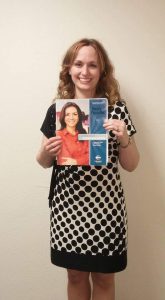
——————————————————————————————————-
Title: The Power of Words and how to Talk like TED, Mandy’s Speech # 10 – Inspire
Imagine being publicly humiliated overnight on a global scale. You no longer have a private life, a protected life. You are reminded every day of the biggest mistake of your life. One you made in your early 20’s. Now you’re over 40 and you’re still known as a slut, a tramp or simply that woman. This is how Monica Lewinsky references herself and recalls her past in the TED Talk she gave in March of 2015. (Show picture of her – point to slide)
Monica is of course the White House intern with a romantic link to former President Bill Clinton. Their affair set off a worldwide media frenzy and political scandal in 1998. Even if you don’t like or know a thing about Ms. Lewinsky, I believe you’d be captivated by her TED TALK speech and impressed with her delivery, just as I was. After all, you don’t typically get invited to do a TED Talk unless you are inspiring, informative or thought provoking in some way.
TED stands for Technology, Entertainment and Design. They are 18 minutes speeches that are typically given at conferences. They are recorded and put on a website. Each video has an average viewing of a million people.
Why is TED so popular? I’ve watched about 100 of the videos over the last year and I’ve examined three key elements that I believe make their presentations and speeches successful. It follows much of the same philosophy as our Toastmasters group.
The three key elements to Talk like TED are:
1) Tell a story within your speech – it can be a personal experience or a borrowed one from someone else. But tell a story that may resonate with others.
2) Use facts and statistics – this builds credibility
3) Create a call to action or have a takeaway for the audience
Monica’s TED Talk is one of the most memorable I’ve seen.
First, Monica shared her personal story – She talked about what it felt like to go from being unknown to being publicly humiliated overnight, by every news media outlet in the world.
She details the agony of having to listen to herself for 20 hours – the telephone recordings she had made in private with someone she thought was a friend. Over and over she listened to what she says was “the worst version of herself.”
She asks the audience to raise their hand if they had not done something stupid at the age of 22 that they later regretted. No one seemed to raise their hand.
She gave a humorous story on being hit on by a 27 year old in her 40’s. His failed pick-up line was “I can make you feel 22 again.” Both she and the entire TED Talk audience laughed. Monica said she was the only person who would probably never want to be 22 again.
After the humor she went straight into the serious issue at hand – cyberbullying, although it wasn’t called that in 1998. There was no buzz word for what she experienced at the time.
Monica revealed, “Not a day goes by when I’m not reminded of my past and my public humiliation from 1998.”
Monica then went beyond her personal story. She shared someone else’s story, which is another great tactic for speeches. If you don’t have your own experiences to share, look for someone else’s worth talking about. Monica mentioned Tyler Clementi, a gay Rutgers University freshman who jumped off a bridge in September 2010, just a few days after ridicule and shame took over his social life after his roommate posted an online video of him being intimate with another man.
Monica she was quiet for a long time but finally decided to break her silence to help others and to show and prove that public humiliation can be survived. She had done it. More importantly, her new purpose is to stop a culture of public shaming and cyberbullying.
Monica then went on to the second important TED Talk element – using statistics and data, for validity, like:
A popular telephone hotline, called Childline located in the U.K. reported from 2012 to 2013 that 87% of their calls were related to cyberbullying. 87%.
And she said, according to meta analysis in the Netherlands, Cyberbullying had surpassed direct, physical bullying. No more punches and bruises. Now people stab with words and put them on the internet and social media for everyone to read and find forever.
She also found statistics that revealed that humiliation is more intensely felt emotion than happiness or even anger.
By giving these facts, these statistics, Monica was building her case, giving herself and her cause more credibility.
She demonstrated how we are now living in a “culture of humiliation.” She wants there to be an “intervention on the internet” – for people to build more compassion and have empathy instead of bullying and shaming.
Her tactics were working. I was listening. I was being drawn to her cause as I heard her speak.
When you are developing your own speech or presentation, look for statistics that you can incorporate to help make a point. Is your audience going to remember all of them? Probably not. But they build your case. They help illustrate the proof behind the story you’re telling.
The third and final aspect Monica did in her successful talk is to find a way to create a call to action. We in Toastmasters can do the same. Urge your listeners to do something. Have a takeaway. Give the members of your group something tangible to remember your words.
This makes an impression. This keeps the words in the mind of others. Then they start talking about it and sharing what you said. They become ideas worth spreading, just like the TED Talk tagline says (point to slide).
Monica’s call to action is to have people #click with compassion. She urges the audience to become an “up-stander” or a person who posts only positive comments and reports bullying or negative shaming.
She tells the listeners to “Imagine walking a mile in someone else’s headline.” Monica speaks about all people deserving compassion and everyone deserving a right to a private life both online and offline.
She delivers two lines that struck me as the best ones from her speech. She said, I’m here to “take back my narrative” and “we deserve a chance to write a different ending to our story.”
Those were powerful and thought-provoking words for me. They changed my mind and my opinion of her. Just like that. Does she have to pay for those mistakes the rest of her life? Do others kids deserve to be publicly humiliated online to the point where they want to take their own lives? That is something to ponder.
Closing of speech:
I never thought I’d be quoting Monica Lewinsky or referencing her in a presentation I would give. Her talk isn’t the only incredible one either. There are so many influential, amazing speeches. I have a handout here – my own takeaway for you – that shares ten memorable TED talks that I enjoyed (Hold up my takeaway and hand out at end of speech).
Words are powerful. TED Talks are powerful. We can be powerful in Toastmasters. We can:
1. deliver speeches that tell our stories and the stories of others,
2. use facts to support our narrative,
3. create a call to action to keep the momentum of our talks relevant.
And we can do all of this, as Monica suggests, with more compassion.
==============================================================
(Speech written by Mandy B. Fernandez. Video reference is The Price of Shame TED Talk by Monica Lewinsky)
